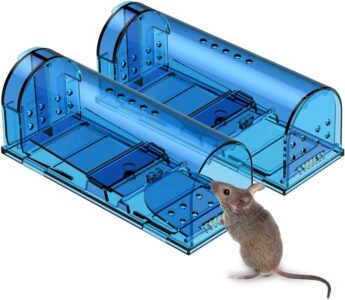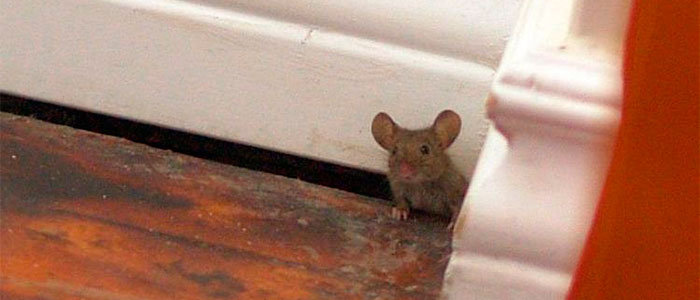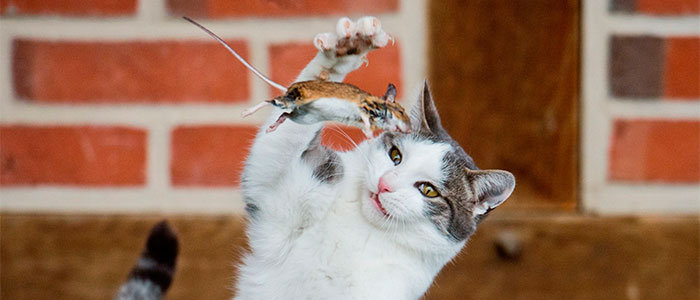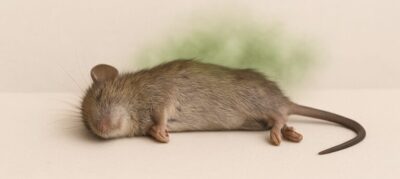Discovering mice in your home can be unsettling, but you don’t have to resort to cruel methods to solve the problem. This comprehensive guide will show you how to humanely get rid of mice, protecting both your home and the well-being of these small creatures. With the right approach, you can learn how to get rid of mice humanely.
Quick Picks: Best Humane Mouse Control Products

Editor’s Choice

Most Humane
- Understanding Mice Behavior: The First Step to Humane Control
- How to Get Rid of Mice Humanely Without Killing Them
- Pet-Safe Mouse Control for Homes with Animals
- Prevention: The Most Humane Approach
- Natural Predators: Nature’s Mouse Control
- Humane Dispatch Methods (When Necessary)
- When to Call Professional Help
- Frequently Asked Questions
Understanding Mice Behavior: The First Step to Humane Control
Before attempting to remove mice from your home, it’s important to understand their behavior. Mice are small, adaptable creatures with strong survival instincts that make them challenging to eliminate.

Mouse Habits
Mice are primarily nocturnal and travel along walls rather than in open spaces. They’re excellent climbers and can squeeze through holes as small as a dime, making prevention challenging.
Feeding Patterns
Mice need only a few grams of food daily to survive. They prefer high-protein foods like peanut butter and are attracted to consistent food sources.
Breeding Cycle
Mice reproduce rapidly, with females capable of having 5-10 litters per year, each with 5-6 pups. This is why a small problem can quickly become an infestation.
How to Get Rid of Mice Humanely Without Killing Them
If you prefer to remove mice without causing harm, there are several effective approaches that respect the lives of these small creatures while protecting your home. Using peppermint oil as a natural repellent can deter mice due to their strong aversion to its scent. Additionally, setting up simple barriers, such as sealing cracks and using the best homemade mouse remedies, can help keep these critters at bay without harm. Moreover, incorporating humane traps allows for safe capture and relocation of any intruding mice. One humane method is to use live traps, which capture mice without harming them, allowing for their release away from your property. Additionally, sealing entry points and maintaining a clean environment can greatly reduce the likelihood of an infestation, serving as a proactive approach to how to eliminate mice effectively. By combining these strategies, you can coexist peacefully with nature while ensuring your home remains mouse-free.
Catch and Release Traps: The Most Humane Option
Catch and release traps are designed to capture mice alive so they can be safely relocated away from your home. These humane mouse traps are simple to use and highly effective when placed correctly.
Humane Catch and Release Mouse Trap
Editor's ChoiceHow Does It Work
How to Use
- Place the trap along walls where mice travel
- Bait with peanut butter or another high-protein food
- Check the trap at least once daily
- When a mouse is caught, transport the trap to a release site at least 1 mile from your home
- Open the trap door and allow the mouse to exit on its own
- Completely humane with no harm to mice
- Transparent design lets you see when you've caught something
- Reusable for multiple captures
- No dangerous chemicals or mechanisms
- Safe for use in homes with children and pets
- Requires daily checking to prevent stress to captured mice
- Must be emptied away from your home to prevent return
- Only catches one mouse at a time
When releasing mice, choose areas with natural brush and cover at least a mile from residential areas to prevent them from returning to your home or becoming someone else’s problem.
Electronic Deterrents: A No-Contact Solution
Ultrasonic Mouse Repellent
Most HumaneHow Does It Work
How to Use
- Plug the device into a standard electrical outlet
- Position units in areas with mouse activity
- Use multiple units for larger spaces or severe infestations
- Keep units unobstructed by furniture for maximum coverage
- Allow 1-2 weeks for full effectiveness as mice adjust and relocate
- No trapping or killing of mice
- Silent to human ears
- Safe for use around children
- No chemicals or poisons
- Low electricity consumption
- May lose effectiveness over time as mice become accustomed to the sound
- Not effective through walls or around corners
- May not repel all mice, especially those in established nests
- Some pets (particularly rodent pets like hamsters or guinea pigs) may be disturbed
Electronic mouse deterrents use ultrasonic sound waves that are unpleasant for mice but inaudible to humans and most pets. These devices can be an effective way to drive mice away without any physical interaction.
- Prepare the area by removing food sources and clutter that might attract mice.
- Place multiple electronic deterrents throughout your home, focusing on entry points and areas with mouse activity.
- Plug the devices into electrical outlets and ensure they remain powered.
- Monitor for continued mouse activity and adjust placement if necessary.
- Replace batteries or recharge devices as needed to maintain effectiveness.
Natural Repellents: Using Scents Mice Dislike
Certain scents are naturally repulsive to mice and can be used as a humane deterrent. These options are non-toxic, safe for homes with pets and children, and can be quite effective when used correctly.

- Peppermint oil – Mice detest the smell of peppermint. Soak cotton balls in peppermint oil and place them in suspected entry points, cabinets, and corners. Replace every few days to maintain potency.
- Cayenne pepper or cloves – Sprinkle these spices around entry points and affected areas to create a natural barrier.
- Cedar – Cedar chips or blocks can repel mice when placed in closets, attics, and basements.
- Vinegar solution – A mixture of vinegar and water sprayed around entry points can deter mice due to its strong scent.
Pet-Safe Mouse Control for Homes with Animals
If you have pets, it’s crucial to choose mouse control methods that won’t put your furry family members at risk. Many conventional mouse poisons and traps can be harmful or even fatal to cats and dogs.

Why Traditional Mouse Control Can Harm Pets
Traditional rodenticides contain toxic chemicals that can cause severe illness or death if ingested by pets. Even bait stations and snap traps can injure curious pets that investigate these devices.
- Rodenticides containing anticoagulants can cause internal bleeding in pets that consume them.
- Bromethalin, another common rodenticide, affects the brain and spinal cord and is particularly dangerous to cats even in small amounts.
- Snap traps can injure paws, tails, or noses of curious pets.
- Glue traps can stick to fur, causing distress and injury to pets trying to free themselves.
Safe Alternatives for Homes with Pets
Several pet-safe options exist for controlling mice without endangering your domestic animals:
If you suspect your pet has ingested mouse poison, contact your veterinarian or the Animal Poison Control Center (ASPCA) at 1-888-426-4435 immediately. Keep the product package for reference, as your vet may need to know the active ingredients and their concentration.
Prevention: The Most Humane Approach
The most humane and effective long-term solution for mouse problems is prevention. By making your home less attractive and accessible to mice, you can avoid the need for traps or deterrents altogether. Sealing up cracks and ensuring that all food is stored in airtight containers are crucial steps in this process. However, if the problem persists, it may be necessary to consider the best mouse poison options available as a last resort. Remember, combining preventive measures with careful management can lead to a mouse-free environment in the long run.

Sealing Entry Points
Mice can squeeze through incredibly small openings. A comprehensive inspection and sealing of your home is essential for long-term mouse prevention.
Food Management Strategies

Eliminating food sources is crucial for preventing mice infestations. Even the cleanest homes can attract mice if food is accessible. To further deter these pests, it’s essential to seal any openings and cracks in walls and foundations where mice can enter. Additionally, storing food in airtight containers can significantly reduce the chances of an infestation. For those struggling with a persistent problem, researching how to eliminate mice effectively can provide valuable strategies for long-term prevention. Properly sealing food containers and disposing of waste can significantly reduce the risk of attracting these pests. Additionally, it’s important to educate yourself on how to eliminate field mice by identifying entry points and blocking them. Regularly inspecting your home for signs of mice can help catch an infestation early and keep your space pest-free.
- Store all food, including pet food, in airtight glass or metal containers.
- Clean up crumbs and spills immediately, especially in kitchens and dining areas.
- Don’t leave pet food out overnight.
- Keep garbage in sealed containers and remove it regularly.
- Harvest fruits and vegetables from gardens promptly and clean up fallen fruit.
Yard and Garden Maintenance
Your outdoor spaces can provide the perfect habitat for mice before they venture indoors. Proper maintenance can discourage mice from establishing themselves on your property.
Prevention requires consistent effort. Conduct seasonal inspections of your home and property to identify and address new potential entry points or attractants before mice discover them.
Natural Predators: Nature’s Mouse Control
Nature has provided its own solution to mouse problems in the form of predators. While this approach requires less direct intervention from you, it can be an effective complement to other methods.
Cats: The Traditional Mouse Hunters
Cats have been controlling rodent populations for thousands of years and remain one of the most effective natural deterrents.

Not all cats are equally skilled at hunting mice. Female cats typically make better mousers than males, and certain breeds have stronger hunting instincts. The most effective mousing breeds include:
- Siamese: Energetic and playful with strong hunting instincts
- Maine Coon: Large and powerful natural hunters
- Manx: Outgoing, friendly, and excellent at catching rodents
- Domestic Shorthair: Hardworking and will hunt for sport
- Siberian: Surprisingly agile despite their size and excellent mousers
Mice can detect a protein found in cat saliva called “MUPS” (major urinary proteins). Their vomeronasal organ, also known as Jacob’s organ, can smell this protein, causing mice to freeze or flee even if they’ve never encountered a cat before.
Other Natural Predators
If adopting a cat isn’t an option, other predators can also help control mouse populations, particularly in outdoor spaces:
Dogs
Certain dog breeds like Jack Russell Terriers, Cairn Terriers, Dachshunds, and Papillons were specifically bred to hunt rodents and can be effective mouse controllers.
Owls
Barn owls and other owl species are nocturnal hunters that can significantly reduce outdoor mouse populations. Installing owl nesting boxes on your property can attract these beneficial predators.
Diurnal Birds of Prey
Hawks and falcons hunt during daylight hours and can complement the nocturnal hunting of owls to provide round-the-clock mouse control.
Humane Dispatch Methods (When Necessary)
While this guide focuses on humane removal, there may be situations where euthanizing a mouse becomes necessary, such as when dealing with an injured mouse that cannot be saved. In these cases, using the most humane method possible is essential.
Humane euthanasia should only be considered as a last resort when a mouse is suffering and cannot be released or rehabilitated. Always attempt catch-and-release methods first.
Quick and Humane Options
If euthanasia becomes necessary, the goal should be to minimize suffering by making death as quick and painless as possible.
When to Call Professional Help
Sometimes, despite your best efforts, a mouse problem may be too extensive to handle on your own. Recognizing when to call in professionals is important for effective, humane control.
Signs You Need Professional Assistance
- You’re seeing mice during daylight hours (indicates a large population)
- Your home has multiple mice despite your control efforts
- You hear scratching in multiple walls or areas of your home
- You have a recurring mouse problem that returns after each control attempt
- You have an infant, elderly person, or immunocompromised individual in your home (due to health risks)
Choosing a Humane Pest Control Service
Not all pest control companies take a humane approach. When selecting a service, ask the following questions:
Frequently Asked Questions
How far away should I release caught mice?
Mice should be released at least 1-2 miles from your home in a suitable natural habitat with adequate cover and food sources. Releasing them too close to your home may result in them returning, while releasing them in inappropriate environments could lead to their suffering or death.
Choose wooded areas or fields away from other residential properties to prevent creating problems for others.
Are ultrasonic repellers truly effective against mice?
Ultrasonic repellers show mixed results. They may initially deter mice, but effectiveness often diminishes as mice become accustomed to the sound. For best results, use ultrasonic devices as part of a comprehensive approach that includes exclusion methods, sanitation, and other deterrents.
Regularly moving the devices to new locations can help prevent mice from becoming habituated to the sound.
How can I tell if I have one mouse or an infestation?
Signs of a larger infestation include seeing multiple mice (especially during daylight hours), hearing noises from different areas of your home, finding numerous droppings in multiple locations, and noticing a strong ammonia-like odor from urine. One or two mice might leave minimal evidence, while an infestation will show more widespread signs.
Track your sightings in a notebook to help determine the extent of the problem.
How quickly do humane methods work?
The timeline varies based on the method and extent of the mouse problem. Catch-and-release traps can work immediately but require catching each mouse individually. Ultrasonic devices may take 1-2 weeks to show results. Natural repellents typically need regular reapplication over several weeks.
For complete resolution, expect to spend 2-4 weeks implementing a comprehensive approach that combines multiple methods.
Are mice dangerous to have in my home?
While mice may look harmless, they can pose several health risks. They can spread diseases through their droppings and urine, trigger allergies and asthma, contaminate food, and cause property damage by chewing on wires, insulation, and structural materials. Even a small mouse problem should be addressed promptly.
However, humane removal methods can effectively address these concerns without unnecessary cruelty.



